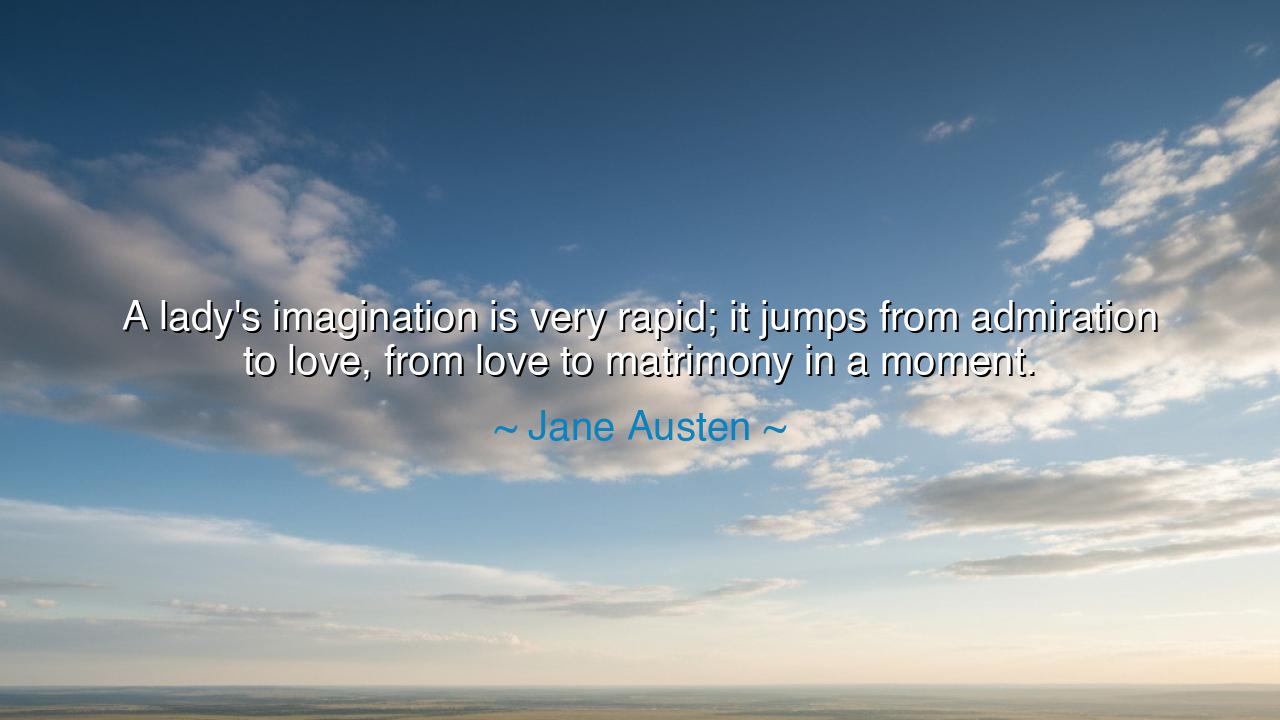
A lady's imagination is very rapid; it jumps from admiration to
A lady's imagination is very rapid; it jumps from admiration to love, from love to matrimony in a moment.






"A lady's imagination is very rapid; it jumps from admiration to love, from love to matrimony in a moment." So wrote Jane Austen, the quiet observer of hearts and tempests alike, the gentle sculptor of human folly and affection. In this brief and delicate line lies not mockery, but revelation. Austen, with her keen wit and subtle irony, reveals the swiftness of the human heart, especially when touched by the spark of affection. The imagination, she tells us, does not walk — it leaps. It does not reason — it dreams. And in that dream, admiration flowers swiftly into love, and love into the sacred bond of matrimony, before reason has even drawn breath.
In Austen’s world, the imagination of a lady is both her crown and her chain. It gives her the power to envision beauty, to create worlds unseen — but it can also ensnare her in illusions. To admire a gentleman’s charm, his voice, his countenance, is to begin a story within her heart — a story she completes long before the first chapter of reality begins. In this way, the imagination becomes the architect of destiny, sometimes building temples of joy, and sometimes illusions that crumble at the touch of truth. Such is the dual nature of passion: both divine fire and dangerous flame.
Let us turn our gaze to history, and see how this truth unfolds beyond the pages of fiction. Consider Mary Queen of Scots, whose heart, noble and fervent, was ever drawn by the allure of romance and the promise of union. Her admiration for the handsome Lord Darnley soon blossomed into love, and that love hastened into marriage — a marriage that brought her ruin. Her imagination, too swift, wove a vision of devotion where ambition and betrayal lurked beneath. Thus was she undone, not by fate alone, but by the impetuous leap from admiration to love, from love to matrimony. Yet even in her fall, one sees the grandeur of the human heart — that it dares to dream, though it bleeds for it.
But we must not judge such hearts too harshly. For in truth, imagination is the pulse of all great things. Without it, no poet would write, no hero would rise, no lover would hope. It is not the rapidity of the heart that destroys — it is the absence of wisdom to temper it. The ancients taught that passion must be guided by logos, the eternal principle of reason. To feel deeply is divine, but to govern feeling with understanding — that is the mark of true grace. Thus, the quote does not merely laugh at women’s fancy; it speaks to the human condition itself — our longing to make dreams real before the dawn has broken.
Let every reader, then, take heed. When your heart stirs with admiration, do not hasten to call it love. When love blossoms, do not rush to bind it in vow. Let your imagination be your servant, not your master. Admire freely, love wisely, and commit only when time has proven the soul behind the smile. For what the heart perceives in a moment, the truth reveals only through seasons. The tree that grows too swiftly may break beneath the storm; the one that roots itself deeply endures the centuries.
Yet, let us not lose the fire that imagination brings. For though it may lead us astray, it also gives us wings. The heart that dares to dream, that leaps toward beauty, is the heart that lives most fully. The secret, therefore, is not to kill the leap, but to learn when to land. Balance passion with patience, wonder with wisdom, and imagination with insight. Then the rapid current of emotion becomes not a flood that destroys, but a river that nourishes life.
So, dear soul of the future, when you find yourself enchanted by the glimmer of another, pause and listen to the still voice within. Ask not only, “What do I feel?” but also, “What is true?” Let admiration ripen slowly into love, and love into union by the measure of time and virtue. For in the harmony between heart and mind lies the noblest art of living — to dream like a poet, to discern like a sage, and to love like one who has seen both the shadow and the light.






AAdministratorAdministrator
Welcome, honored guests. Please leave a comment, we will respond soon